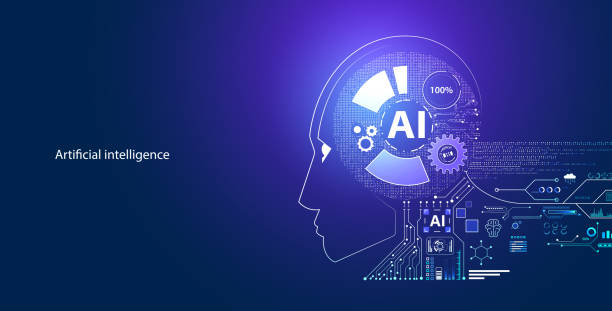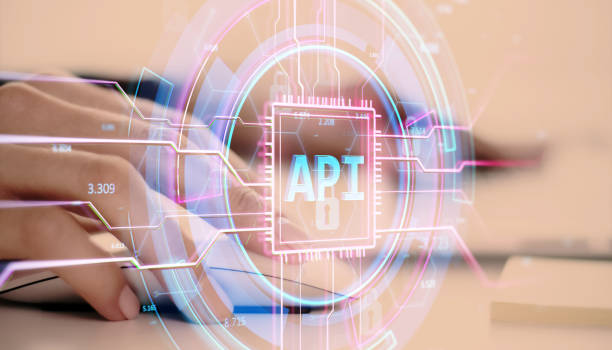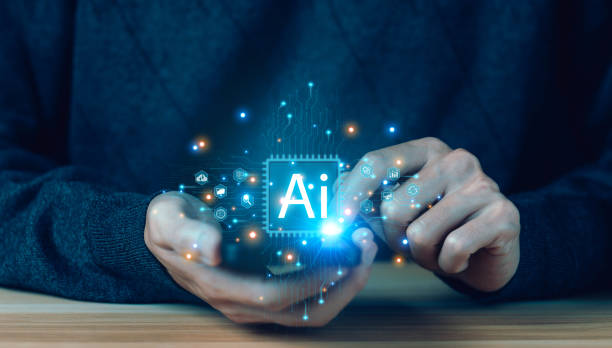What is Artificial Intelligence? Definition, History and Basic Concepts
#Artificial_Intelligence (AI) is a branch of computer science that seeks to create machines that can perform tasks that usually require human intelligence.
These tasks include learning, problem-solving, decision-making, understanding natural language, and pattern recognition.
Artificial intelligence was created with the aim of building systems that can think, learn, and act, independently or with minimal human intervention.
The history of artificial intelligence dates back to the 1950s, when researchers began to explore the possibility of building machines that could think.
Since then, artificial intelligence has made significant progress and is used today in a wide range of industries and applications.
Basic concepts of artificial intelligence include machine learning algorithms, neural networks, natural language processing, and machine vision.
For more information on the history of artificial intelligence, see this link.
These algorithms allow machines to learn from data, make decisions, and solve problems.
In recent years, with technological advances and the increasing volume of available data, artificial intelligence is developing rapidly.
These advances have made it possible to build more complex and powerful artificial intelligence systems that can perform more complex tasks.
Artificial intelligence is used today in various fields such as medicine, finance, transportation, marketing, and manufacturing, and it is expected to play an even more important role in our lives in the future.
Are you losing business opportunities because of an old website? With Rasaweb, solve the problem of not attracting potential customers through your website forever!
✅ Attract more high-quality leads
✅ Increase brand credibility in the eyes of customers
⚡ Get free consulting for corporate website design
Types of Artificial Intelligence Categorized by Capability and Function
Artificial intelligence can be categorized into different types based on capability and function.
One of the most common classifications is dividing artificial intelligence into two general categories: Narrow AI and General AI.
Narrow AI is designed to perform a specific task and cannot perform other tasks.
Examples of Narrow AI include facial recognition systems, language translation, and playing chess.
General AI, on the other hand, has intelligence equal to or greater than human intelligence and can perform any task that a human can do.
Building General AI is still in its early stages, and no General AI systems currently exist.
Click here to preview your posts with PRO themes ››
Another categorization of artificial intelligence based on function includes Reactive AI, Limited Memory AI, Theory of Mind AI, and Self-Aware AI.
Reactive AI is the simplest type of artificial intelligence and only makes decisions based on the information available at the moment.
Limited Memory AI can store limited information in its memory and use it for future decisions.
Theory of Mind AI can understand the emotions and beliefs of others and use that to predict their behavior.
Self-Aware AI is the most complex type of artificial intelligence and has self-awareness and understanding of itself.
To learn more about the types of artificial intelligence, visit this link.
Applications of Artificial Intelligence in Various Industries: Transformation and Innovation
Artificial intelligence is currently used in a wide range of industries and applications, causing transformation and innovation in these industries.
In the medical industry, artificial intelligence is used to diagnose diseases, develop drugs, personalize treatment, and improve patient care.
For example, artificial intelligence systems can analyze medical images with greater accuracy than doctors and diagnose diseases in the early stages.
In the financial industry, artificial intelligence is used to detect fraud, manage risk, provide customer service, and develop new financial products.
In the transportation industry, artificial intelligence is used to develop self-driving cars, optimize routes, and manage traffic.
In the marketing industry, artificial intelligence is used to personalize advertising, analyze customer behavior, and improve customer experience.
In the manufacturing industry, artificial intelligence is used to automate processes, improve product quality, and reduce costs.
These are just a few examples of the applications of artificial intelligence in various industries, and it is expected that more applications of artificial intelligence will be seen in these and other industries in the future.
See an article about this at this link
| Industry | Application |
|---|---|
| Medicine | Disease diagnosis, drug development |
| Finance | Fraud detection, risk management |
| Transportation | Development of self-driving cars, route optimization |
| Marketing | Personalized advertising, customer behavior analysis |
Advantages and Disadvantages of Artificial Intelligence: Examining Positive and Negative Effects
Artificial intelligence has many advantages and disadvantages that should be seriously considered.
The advantages of artificial intelligence include increased efficiency, reduced costs, improved accuracy, increased speed, and the creation of new opportunities.
Artificial intelligence systems can perform tasks faster and more accurately than humans and can work in dangerous or repetitive environments.
Also, artificial intelligence can help create new products and services and improve the quality of human life.
The disadvantages of artificial intelligence include job loss, discrimination, privacy violations, security, and existential risks.
Automation caused by artificial intelligence can lead to the loss of many jobs, especially jobs that are repetitive and routine.
Artificial intelligence systems may be discriminatory if the data on which they are trained is discriminatory.
Also, artificial intelligence can be used to violate people’s privacy and can lead to serious security risks.
Learn more about the risks of artificial intelligence at this link.
Are you falling behind in competition with large online stores?
Rasaweb will put your business online with a professional online store design and increase your market share!
✅ Increase brand credibility and customer trust
✅ Easy shopping experience leading to more sales
⚡ Act now to receive free website design consultation!
Ethical Challenges of Artificial Intelligence: Accountability and Transparency
The development and use of artificial intelligence raises many ethical challenges that should be taken seriously.
One of the most important ethical challenges of artificial intelligence is accountability.
If an artificial intelligence system makes a mistake and causes harm, who is responsible? Are the developers, users, or the artificial intelligence system itself responsible? These questions do not have easy answers and require careful discussion and consideration.
Another ethical challenge of artificial intelligence is transparency.
How can we ensure that artificial intelligence systems operate transparently and understandably? If an artificial intelligence system makes a decision, how can we understand why it made that decision? Transparency is essential for building trust in artificial intelligence systems and preventing their misuse.
Read an article about the ethical issues of artificial intelligence at this link.
The Future of Artificial Intelligence: Key Predictions and Trends
The future of artificial intelligence is very bright and full of opportunities.
It is predicted that artificial intelligence will play an even more important role in our lives in the future and will cause significant transformations in various industries.
Some of the key trends in the future of artificial intelligence include expanding applications of artificial intelligence, technological advances, increased investment, development of ethics and legislation, and increased public awareness.
It is predicted that the applications of artificial intelligence will expand dramatically in the future and that artificial intelligence will be used in various fields such as health care, education, energy, environment, and security.
Technological advances in artificial intelligence will continue rapidly, and machine learning algorithms, neural networks, and natural language processing will improve.
Investment in artificial intelligence will increase increasingly, and companies and governments will seriously invest in artificial intelligence research and development.
The development of ethics and legislation is necessary to ensure the responsible and safe use of artificial intelligence, and governments and international organizations are working on drafting laws and regulations related to artificial intelligence.
Machine Learning, a Subset of Artificial Intelligence
Machine Learning is one of the main subsets of artificial intelligence that allows machines to learn from data without explicit programming.
In other words, machines analyze data, identify patterns and relationships in them, and use this knowledge to predict or make decisions about new data.
This learning process can be done automatically and without human intervention.
Machine learning algorithms are diverse, and each is suitable for a specific type of problem.
For example, regression algorithms are used to predict continuous values such as house prices or air temperature, while classification algorithms are used to assign data to different categories such as spam detection or disease diagnosis.
Machine learning plays a very important role in the development of artificial intelligence, and many of today’s artificial intelligence applications are based on machine learning algorithms.
Learn more about machine learning at this link.
For example, facial recognition systems, movie and music recommendation systems, and fraud detection systems all use machine learning algorithms.
| Learning Type | Description |
|---|---|
| Supervised Learning | The model is trained using labeled data. |
| Unsupervised Learning | The model is trained without using labeled data. |
| Reinforcement Learning | The model is trained by interacting with the environment and receiving feedback. |
| Semi-Supervised Learning | The model is trained using a combination of labeled and unlabeled data. |
Natural Language Processing (NLP): Human-Machine Interaction
Natural Language Processing (NLP) is a branch of artificial intelligence that allows machines to understand and interact with human language.
NLP includes a set of techniques and algorithms that help machines analyze human text and speech, extract meaning, and generate appropriate responses.
NLP applications are very broad and include machine translation, speech recognition, text summarization, sentiment analysis, and chatbots.
For example, machine translation systems like Google Translate use NLP to translate texts between different languages.
Voice recognition systems like Siri and Alexa use NLP to understand human voice commands and respond to them.
NLP plays a very important role in the development of artificial intelligence and allows machines to communicate with humans more naturally and effectively.
For more information on natural language processing, visit this link.
Are you tired of losing customers due to poor online store design? With Rasaweb, solve this problem forever!
✅ Increase sales and visitor-to-customer conversion rate
✅ Smooth and attractive user experience for your customers⚡ Get free consultation
Computer Vision: Understanding Images and Videos
Computer Vision is a branch of artificial intelligence that allows machines to understand images and videos and extract information from them.
Computer vision includes a set of techniques and algorithms that help machines identify and analyze objects, people, scenes, and events in images and videos.
Computer vision applications are very broad and include facial recognition, object detection, medical image analysis, self-driving cars, and video surveillance.
For example, facial recognition systems in smartphones and security systems use computer vision to identify people’s faces.
Self-driving cars use computer vision to detect obstacles and traffic signs.
Computer vision plays a very important role in the development of artificial intelligence and allows machines to understand and interact with the world around them.
By combining computer vision with other branches of artificial intelligence, it is possible to build very powerful artificial intelligence systems capable of performing complex tasks.
Skills Needed to Enter the World of Artificial Intelligence
Entering the world of artificial intelligence requires acquiring various skills that include technical knowledge, analytical skills, and soft skills.
Among the most important technical skills are proficiency in programming languages such as Python, familiarity with machine learning algorithms, understanding mathematical and statistical concepts, and familiarity with artificial intelligence frameworks and libraries.
Also, having strong analytical skills is necessary for analyzing data, identifying patterns, and solving artificial intelligence problems.
In addition, soft skills such as critical thinking, problem-solving, communication, and teamwork are also very important for success in this field.
To acquire these skills, you can use various methods such as attending online and in-person training courses, studying books and scientific articles, participating in artificial intelligence projects, and gaining practical experience.
Also, joining artificial intelligence communities and attending related conferences and events can help you become familiar with the latest advances in this field and connect with other experts.
Artificial intelligence is a broad field and requires continuous study.
Frequently Asked Questions
| Question | Answer |
|---|---|
| What is artificial intelligence? | It is a simulation of human intelligence in machines programmed to think like humans and imitate their actions. |
| What are the main branches of artificial intelligence? | They include machine learning, deep learning, natural language processing, computer vision, and robotics. |
| What is Machine Learning? | It is a branch of artificial intelligence that focuses on enabling systems to learn from data and identify patterns without explicit programming. |
| Give examples of artificial intelligence applications in our daily lives. | Voice assistants (like Siri and Alexa), recommendation systems in Netflix and Amazon, self-driving cars, and facial recognition software. |
| What is Deep Learning? | It is a subset of machine learning that uses multi-layered (deep) artificial neural networks to process large amounts of data. |
| What is Natural Language Processing (NLP)? | It is a branch of artificial intelligence that focuses on enabling computers to understand, interpret, and generate human language. |
| What are some ethical concerns related to artificial intelligence? | They include bias in data, privacy, job loss, and liability in case of errors. |
| What are the main benefits of artificial intelligence? | Increased efficiency, improved decision-making, automation of repetitive tasks, and discovery of complex patterns in data. |
| How is artificial intelligence used in healthcare? | In disease diagnosis, drug discovery, medical image analysis, and personalized patient care. |
| How do you see the future of artificial intelligence? | It is expected to continue to evolve at a rapid pace, affecting all aspects of human life, from industry to education and entertainment. |
Other services of Rasa Web Advertising Agency in the field of advertising
Smart Direct Marketing: A novel service to increase SEO ranking improvement through Google Ads management.
Smart Social Media: Designed for businesses looking to manage campaigns through precise audience targeting.
Smart Social Media: A combination of creativity and technology for online growth by using real data.
Smart SEO: A fast and efficient solution for online growth with a focus on using real data.
Smart Data Analysis: Transform your click-through rate with the help of dedicated programming.
And more than hundreds of other services in the field of internet advertising, advertising consulting, and organizational solutions
Internet Advertising | Advertising Strategy | Reportage Advertising
Resources
Applications of Artificial Intelligence
,What is Artificial Intelligence and what are its applications?
,The Future of Artificial Intelligence and Opportunities Ahead for Iran
,Ethical Challenges of Artificial Intelligence and its Responsibilities
? Are you ready to elevate your business in the digital world? Rasaweb Afarin Digital Marketing Agency, by offering innovative and targeted solutions including WordPress website design, SEO and comprehensive marketing strategies, helps you on the path to achieving your goals.
📍 Tehran, Mirdamad Street, next to Central Bank, Kazerun South Alley, Ramin Alley No. 6
“`














